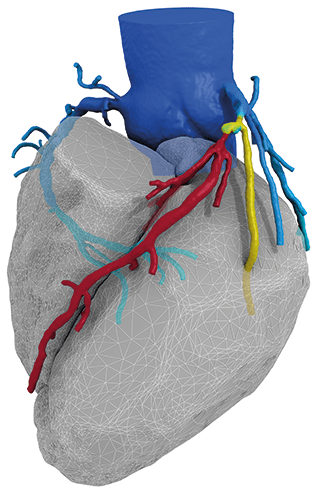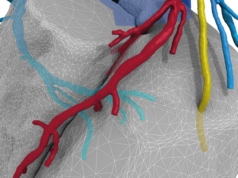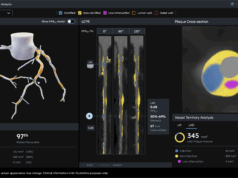
A study assessing the impact of the addition of adding coronary computed tomography angiography (CCTA)-derived fractional flow reserve (FFR)—FFRCT—as a diagnostic pathway for the evaluation and management of coronary artery disease (CAD), suggests that the model can improve cath lab efficiency.
Two-year results from FISH&CHIPS, a real world, multicentre, retrospective clinical study with 90,553 patients conducted by National Health Service (NHS) England were presented at the European Society of Cardiology (ESC) congress (25 – 28 August, Amsterdam, The Netherlands) by principal investigator Tim Fairbairn (Liverpool Heart and Chest Hospital, Liverpool, UK).
FFRCT is part of a clinical pathway for evaluation and diagnosis of CAD that provides insight into a patient’s condition with a patient-specific visual model of the heart’s blood flow, helping physicians make accurate diagnoses and treatment decisions.
The FISH&CHIPS study was designed to assess the incremental impact of adding HeartFlow FFRCT to a CCTA-first diagnostic pathway to evaluate and manage CAD.
FISH&CHIPS two-year key outcomes associated with availability of FFRCT include a significant, 14% relative reduction in cardiovascular mortality, and a significant 8% relative reduction in all-cause mortality.
An increase in cath lab efficiency, driven by a 5% relative reduction in invasive cardiac angiography (ICA) and an 8% relative increase in percutaneous coronary intervention (PCI). A 14% relative reduction in additional non-invasive heart testing following CCTA, and a high prognostic value for FFRCT whereby patients with severely abnormal FFRCT values (≤0.50) had two times the risk of all-cause death and three times the risk of non-fatal MI compared to patients with normal FFRCT values.
“The foresight and continued leadership of NHS England in challenging the status quo and implementing new approaches like the CCTA+ FFRCT pathway has a widespread impact on the industry globally,” said Campbell Rogers, chief medical officer, HeartFlow. “The nationwide CCTA-first approach for evaluating patients with possible cardiovascular disease has become the model of both clinical efficacy and efficiency, which is why clinical guidelines across the globe have adopted it. FISH&CHIPS demonstrates that NHS England’s decision to incorporate the HeartFlow FFRCT analysis into that pathway extended the lives of many English patients and ensured efficient and effective use of non-invasive and invasive testing and treatment.”
“At NIHR Clinical Research Network North West Coast (CRN NWC), we are delighted to see these impressive results from the FISH&CHIPS study, which shows that the introduction of a new health technology, FFRCT, at a national level was associated with a reduction in cardiovascular death and invasive angiography,” said Enitan Carrol, clinical director, Clinical Research Network: North West Coast. “The study was funded by the MRC, which followed on from CRN NWC capacity building support for Dr Fairbairn as a Research Scholar between 2017 and 2019.”










